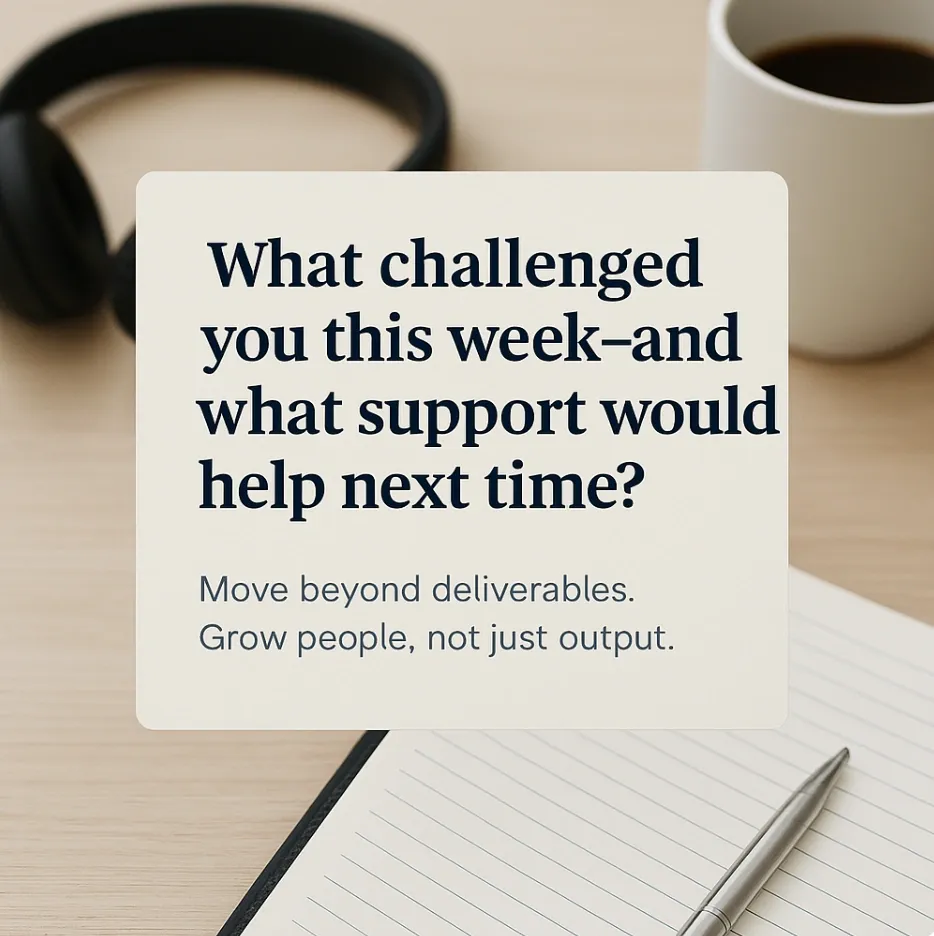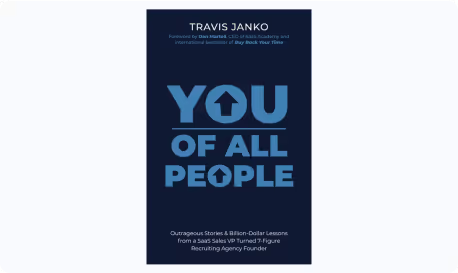I’ve been thinking a lot lately about the rhythm of leadership and the conversations we have with our teams. Specifically, what’s the one question every leader should ask their team at the end of the week to genuinely un...


I’ve been thinking a lot lately about the rhythm of leadership and the conversations we have with our teams. Specifically, what’s the one question every leader should ask their team at the end of the week to genuinely understand their experience and foster growth?
Let me give you a hint: it’s NOT “What did you get done?”
In the hustle of our work lives, especially in fast-paced environments like SaaS it’s all too easy to default to conversations centered purely on deliverables, deadlines, and dashboards. We’re conditioned to measure progress by outputs. But if we only focus on the what, we miss the how and, more importantly, the who. True leadership means tuning into the human side of performance—understanding the journey, not just the destination.
For many leaders, the weekly check-in often revolves around that familiar question: “What did you accomplish this week?” On the surface, it seems practical. It’s about accountability, progress tracking, and ensuring things are moving forward. But relying solely on this question can have several unintended consequences:
It fails to capture the full picture. Some of the most critical work involves wrestling with complex problems, navigating unforeseen obstacles, or laying the groundwork for future success. This effort isn’t always neatly packaged into a list of completed tasks by Friday.
It can encourage a focus on busywork. When the primary measure is the quantity of items checked off a list, there’s a subtle pressure to prioritize tasks that are easily completed over those that are more strategic or impactful but perhaps less tangible in the short term.
It hides struggles until it’s too late. High achievers may hesitate to admit they're stuck if the conversation is solely about accomplishments. Leaders might not become aware of roadblocks until a deadline is looming or a problem has escalated.
It can feel transactional. A relentless focus on deliverables makes interactions feel like status reports, not real conversations. That erodes personal connection and trust.
It neglects growth opportunities. If you don’t know where your team is being stretched or feeling friction, you can’t support development—or coach effectively.
So, if “What did you get done?” isn’t the right question, what should you ask? Try this at your next weekly check-in:
“What’s one thing that challenged you this week, and what support would help you handle it better next time?”
That small shift from pure output to experience and support can do a remarkable amount of heavy lifting.
It surfaces hidden roadblocks early. You’ll start hearing about:
It builds trust and psychological safety. Asking about challenges (and offering support) sends a powerful message: “It’s okay to not have all the answers. I’ve got your back.” That kind of leadership unlocks:
It turns check-ins into coaching. The second half “what support would help next time?” is where the magic happens. You’re not solving it for them; instead, you’re helping them reflect, opening up development conversations, and making space for growth. That’s leadership.
This shift in questioning stems from a fundamental belief: The job isn’t just to track work. It’s to grow people.
When you invest in your team’s growth, skills, confidence and decision-making, the work gets done faster, better, and more sustainably. That leads to:
To make this shift stick, keep it intentional:
Set the stage. Explain why you’re asking, making it clear your goal is to support, not scrutinize.
Listen without judgment. Pay close attention to what’s said… and what’s not.
Follow through. If someone names a support need, acting on it shows the question truly matters.
Be consistent. Ask it every week, because repetition builds safety.
Model it yourself. When appropriate, share a challenge you’ve faced and how you handled it; this helps set the tone.
This question is powerful but it’s just one tool. The real goal is creating a culture of honest, supportive, growth-oriented communication. And that doesn’t come from better dashboards. It comes from better conversations.
Try asking it this Friday. Then listen and act.
That’s how you build real teams.
By Travis Janko, CEO of GSD Coach & Recruiting, helping SaaS founders build the top 5% of talent, FAST!
Get more expert advice for SaaS founders on sales hiring, recruiting strategies, team leadership, and building high-performing sales teams.


Get started today with a free, no-obligation discovery call. Just fill out the form and share your revenue goals. We’ll be in touch within 24 business hours to show you how our proven systems can accelerate your hiring process.
.avif)


Our proven methodology has helped SaaS companies across every growth stage build revenue teams that drive predictable, scalable results. Connect with us to discover how we can accelerate your hiring process and deliver the A-Player talent your company needs to reach its next milestone.